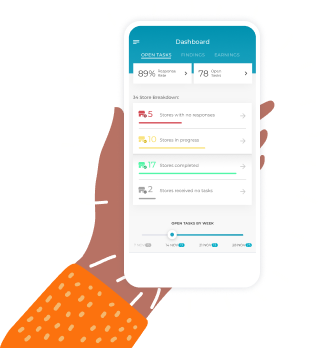The holiday spirit may feel less jolly this year, and not just because customers and store staff will be wearing masks and socializing from a safe distance.
The frenetic shopping season between Thanksgiving and Christmas has always called for extra patience in retail operations and—for some stores—more security guards. But holiday retail during the Covid-19 pandemic is likely to have shoppers and sales associates more on edge than usual. For some consumers, complying with restrictions meant to curb the virus has become a political issue.
But handling hostile customers who flout public health guidelines can be difficult, awkward and even dangerous. YouTube teems with videos capturing altercations at grocery and big box stores nationwide. Disputes over wearing a mask have already turned deadly in several cases, with people killed in Michigan and New Mexico as retail workers tried to enforce mask-wearing regulations.
In November, the National Retail Federation (NRF) introduced online tools geared toward helping retailers prepare for the particular challenges of the 2020 holiday shopping season. Culling best practices from the first nine months of the pandemic, the program teaches retail operations workers how to handle a belligerent shopper who refuses to wear a mask or leave enough space between customers in the checkout line.
Retailers must take proactive measures to create a safe environment and ensure a smooth shopping season. If they don’t, the typical tensions of the holiday season plus the daily pressures of the pandemic could turn a dispute over the last can of pumpkin puree on the shelf into a recipe for disaster.
Training Focuses on Mask Requirements, Shopper-to-Shopper Conflicts, and Line Management
Foot traffic typically swells during the countdown to Christmas, with last-minute shoppers swarming aisles and growing ranks of temporary employees learning how to operate the cash register.
This year, the pandemic has given consumers more reasons to complain, from policies on wearing a mask to restrictions on the number of people allowed inside the store at a time.
Recognizing that tensions are likely to run higher than usual this December, the NRF’s program covers specific components of retail operations and customer conflict prevention. The program distills lessons from the group’s 16,000 retailers and from the Centers for Disease Control and Prevention (CDC) to teach front-line workers at small and mid-size retailers how to manage and resolve customer conflicts.
“These new credentials will give employees the training they need to continue operating and serving customers safely,” said NRF President and CEO Matthew Shay.
Around 60 retail brands joined an online training held earlier this month. The program is aimed at teaching workers how to prevent and de-escalate conflicts in the store. Designed to comply with state and local requirements for COVID-19 trainings, it also teaches how to recognize COVID-19 symptoms and take appropriate action if exposed.
The trade group said retailers nationwide want to provide their employees with training before the holiday season begins.
“Since our announcement we have received a tremendous amount of interest from a number of retailers about the COVID-19 training programs,” said an NRF spokesperson, Danielle Inman (contact info upon request). “We have had retailers of all sizes and across multiple categories, including grocery, express interest and are developing plans to implement with their workforce.”
Critics Point to Ethical, Safety, and Legal Concerns
Smart retailers know that workers, including those temporarily employed for the holiday season, are—for better or worse—key to de-escalating disputes. But critics point to the ethical, safety, and legal concerns of putting retail workers at risk.
Store incidents already reported this year show that an encounter with a customer who flouts the rules might be awkward at best and fatal at worst. Critics propose hiring additional security guards instead, but that’s a line item that cash-strapped shops can’t afford.
That’s why retail operations executives are hoping the strategies taught in the NRF’s training program can quell a conflict before it becomes violent. The online program trains workers to watch for signs of anxiety in customers’ body language, tone and cadence. It instructs that the best method to de-escalate a dispute is for workers to practice active and empathetic listening and seek to understand a customer’s situation.
The training advocates for a range of approaches in these cases including withholding judgment and allowing silence. If that doesn’t work, employees are encouraged to set limits on a consumer’s behavior by framing options and allowing the customer to choose.
But if a customer proves unreasonable, they may be required to ask him or her to leave the store. Avoiding a power struggle is key to defusing the situation. The program notes that “challenging or exercising authority over a person can escalate negative behaviors,” and that the best option addresses both parties’ needs.
Above all, the program urges employees to practice a Zen-like rational detachment and not take the customer’s behavior personally. One of the final lessons encourages workers to develop “therapeutic rapport” with the customer. “Learn from the conflict and help the other person learn from the experience,” the training says. “Put time and effort into repairing the relationship.”
The Future of Customer Conflict in Retail Operations
The training addresses the challenges facing workers since the pandemic began. “One of the major scenarios is around an employee asking a customer to wear a mask, and he reacts,” said Adam Lukoskie, vice president of the NRF’s non-profit arm that created the program. “There’s another scenario where a mother and child are there and are upset this gentleman is not wearing a mask so then the employee has to help make peace.”
Initially conceived for holiday retail, the training’s scope was quickly broadened to include tips on handling the anticipated uptick in violence following the Nov. 4 presidential elections.
So far this year, retailers report sustaining an estimated $1 billion in insured losses from property damage and theft, according to data from the Insurance Information Institute. The situation is unlikely to improve in the foreseeable future, especially now that a second wave of infections is dovetailing with the holiday shopping season to create an urgent need for shoppers to comply with public health guidelines.
Susan Driscoll, president of the Crisis Prevention Institute, said that the training’s guidelines are practical for real-world situations, such as when a worker needs to communicate with a customer while wearing a mask or assess a customer’s stage of crisis.
“When someone is defensive and losing their rationality, you give them a choice or set a limit,” Driscoll said. “Say, ‘Would you like to get out of the line and talk this through, or would you like to talk to a manager? Giving them a choice puts them back in control, and you get them out of the way and out of the line from customers and help de-escalate the crisis.”
—
Happier shoppers mean more return trips. CB4 helps retailers weather the pandemic by alerting store managers to shifts in consumer demand and helps them capture critical selling opportunities at each location in their chain. See how it works.



